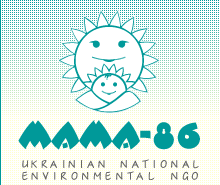Ukrainian non-governmental ecologically concerned organizations propose their own evaluation criteria of social-ecological meaning of the political parties and coalitions pre-election programs
Press-release
8 November 2005
An initiative group of 10 Ukrainian non-governmental ecologically concerned organizations (
"Proportional election system gives citizens a potential possibility to choose the policy of country development, to define its ideological and managerial principals by the programs of the parties that take part in the votes. It is very important for us what political power receive a mandate for the administration in the state for the next five years. It is necessary for us on the stage of the development of pre-election programs to influence their content and to define their principles of economic development of the state, to give them socio-ecological evaluation and to spread this information among voters", — it is said in the claim that are sent to the leaders of the parties, leaders of the political and media ratings.
By the results of previous analysis of the two parties' programs according to the criteria that are stated in the document following facts could be mentioned:
- Only two parties to the concept "quality of life" and welfare of the Ukrainians include ecological component. In other cases, if there is such a concept in the program it considered as not integrated to the priorities of economic development activity. In the most cases the welfare of the citizens is bounded with economic growth.
- Only four parties from the first top twenty consider ecological sustainable development as a priority, one of them consider sustainable development as an aim.
- The most of all mentioned parties — thirteen — call ecological safety one of the main foundation for the state policy, but two of them consider gene engineering ecologically safe and high technology.
- Only one party is against nuclear power. Nine consider energy effectiveness, energy safety and/or development of alternative sources of energy as a priority, but three of them are for further development of atomic energy.
- Only four parties included in their programs overcome of the consequences of Chernobyl catastrophe.
- Only six parties intend to develop infrastructure in the rural area.
- Development of civic society and involvement of public to the decision making are mentioned in the programs of fifteen parties, and development of those mechanisms for providing such a participation only in two programs.
- Only the third of the parties draws attention in their programs to the reformation of management system in the sphere of planning and implementation of state politics.
- Three parties do not mention any of the chosen for analysis criteria, two more do not mention any of stated priorities, accept equity of the men and women.
- Nine parties want equal rights for women and men, but only four of them bear in mind equal participation in administration body.
- Any does not declare equal involvement of women and men in their managerial bodies and pre-electoral lists.
The representatives of initiative group will send the results of preliminary analyses together with the claim to the party headquarters, that should influence the content of the pre-election program. After approval of the pre-election systems the second analysis will be held, the results of which will be given to the public.
For further information call «МАМА-86».
Contact person — Olexandra Zarutska ([email protected]),
tel. 278-77-49, 279-55-14.
